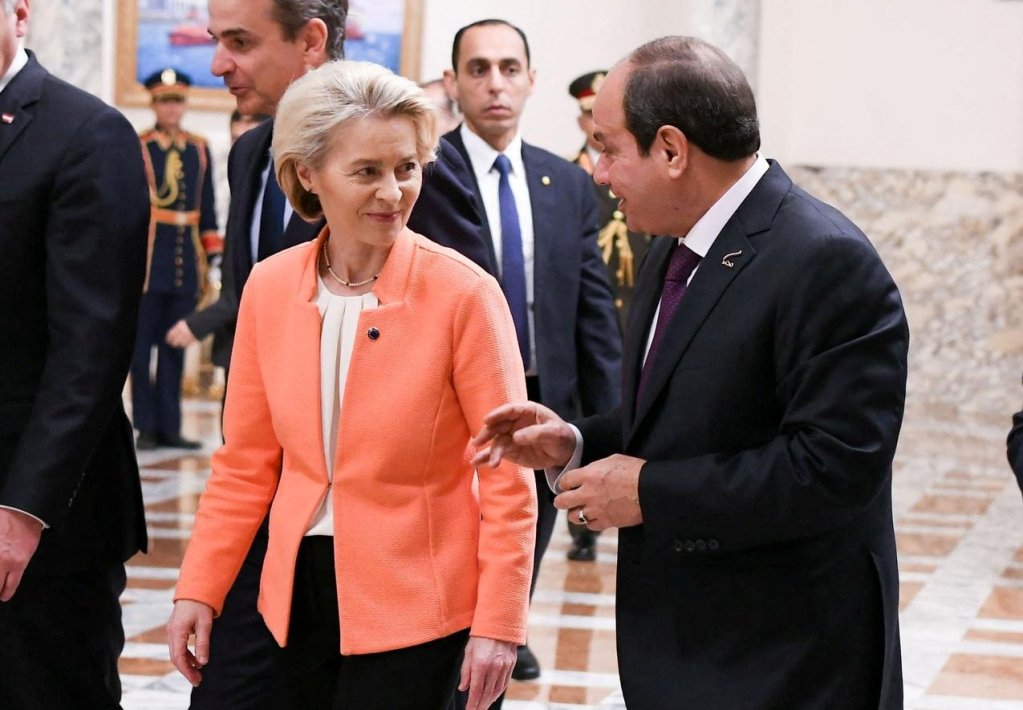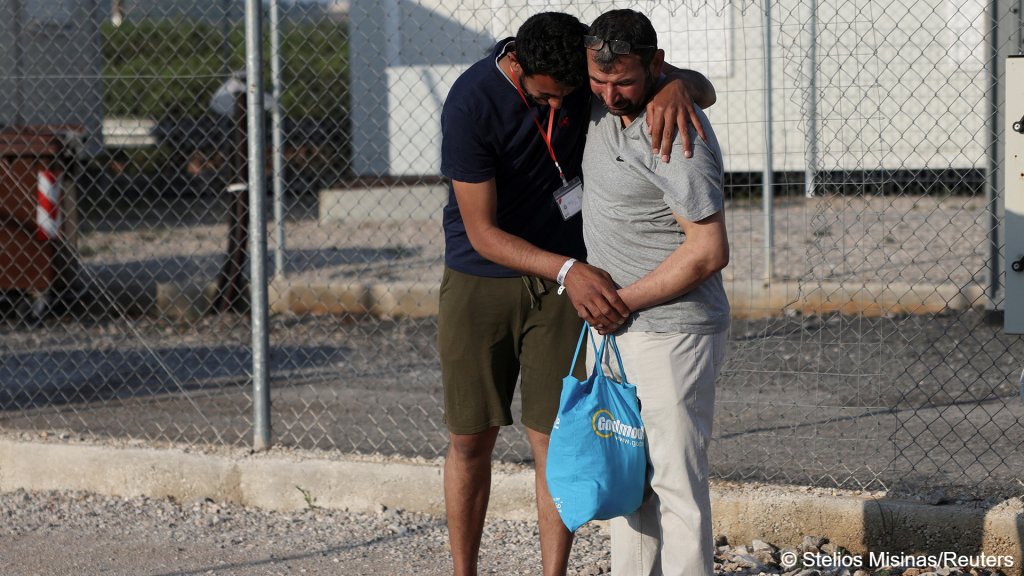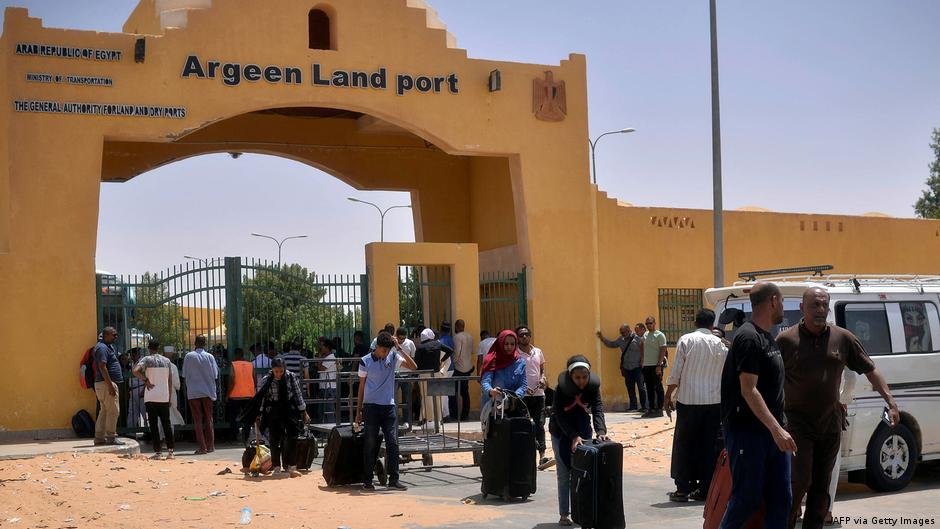The EU rights watchdog has expressed concern over a 7.4 billion euro agreement between the EU and the government of Egypt. It's feared the deal, mainly aimed at stopping migrants reaching Europe, could put human rights at risk.
Pressure is mounting on the European Commission to take into account the issue of human rights before it finalizes deals with countries that include measures aimed at stopping migrants from taking irregular routes to Europe.
Commission President Ursula von der Leyen signed an agreement in Cairo on Sunday (March 17) worth 7.4 billion euros, 200 million euros of which is earmarked for managing migration.
Since 2016, the EU has sealed several similar pacts with Mauritania, Tunisia, Turkey and other countries, which have been sharply criticized by rights groups.
Human Rights Watch has slammed the latest "cash-for-migration-control" deal with Egypt, saying it rewards authoritarianism.
At a news conference on Tuesday, the EU ombudsperson Emily O'Reilly added a statement of caution. Addressing the Commission, she told a news conference that human rights issues, including the possibilities for redress in case of violations, must be the first priority when such deals are made.
"In relation to the fundamental rights issues regarding the various deals that are being done, well, tell us concretely what you're doing," O'Reilly said.
"Because otherwise it looks as if the money is being given, but everything that happens next is slightly more opaque."

The Commission did not immediately respond on Tuesday to a request for comment, the Reuters news agency reported.
Following the signing of the partnership, a Commission spokesperson said human rights had been part of EU-Egypt relations since the Association Agreement (a free trade deal) in 2004 and would continue to be so under the reinforced partnership.
O'Reilly said she was not taking concrete action on the Egypt agreement since her office has yet to receive any formal complaints. But she said she was considering launching a probe into the EU-Tunisia agreement sealed last year, Reuters reports.
What the EU-Egypt deal says about migration
The EU acknowledges Egypt as a "reliable partner" which has a "role as a pillar of security, moderation, and peace in the region."
The new partnership agreement focuses on cooperation in a number of areas, from political relations to economic stability, sustainable investment and trade, food security and climate change, as well as migration.
When it comes to migration governance, support from the EU will cover a range of programs including legal migration pathways and a scheme called "Talent Partnerships".
There will also be support for tackling the root causes of migration, combating migrant smuggling and trafficking, strengthening border management, and managing migrant return and reintegration, according to a joint declaration.
It is not clear what stronger border management will look like, but it may not mean support for the coast guard. Unlike in the case of other African countries such as Libya, Tunisia, or Senegal, Egypt's country’s maritime borders are already well guarded, according to a report commissioned by the EU Asylum Agency (EUAA), and most Egyptians trying to reach Europe travel to Libya and then attempt to cross the Mediterranean from there.
On the situation of hundreds of thousands of migrants and asylum seekers currently in Egypt, the new partnership agreement says the EU will continue to support the government's efforts to host them, and both sides also state their commitment to protecting the rights of migrants and refugees.
Why critics are concerned about human rights
Despite these assurances, concerns are becoming more widespread about the lack of human rights protections in Egypt – a country where Amnesty International reported that in 2022 "authorities severely repressed the rights to freedom of expression, association and peaceful assembly."
In the European Parliament, the bloc made up of the Greens, the European Pirate Party and independents said the deal agreed on Sunday will lead to more suffering.
Many are worried in particular about the fate of migrants and refugees. Greens MEP and migration professor Tineke Strik said the result of cooperating with "dictator Sisi" will be "more violence against migrants, more repression, and more dissidents fleeing the country."
One of the key aims of the EU partnership with Egypt is to stop Egyptian nationals, as well as other migrants using Egypt as a transit country, from crossing the Mediterranean to leave for Europe.

The number of Egyptians among the migrants making these dangerous journeys in recent years has risen substantially. So far in 2024, 798 Egyptian nationals have reached Italy by boat, making Egyptians the fourth largest group after Bangladeshis, Syrians and Tunisians. In 2023, more than 11,000 Egyptians fled to Italy, according to Italian government figures.
The majority of these migrants are said to be driven by economic factors and the search for employment. As a result, of the Egyptian nationals who apply for asylum in Europe, only a very small number (about 6-7%) are successful.
Egypt unable to cope
There are also concerns about the fate of refugees and asylum seekers in Egypt, which numbered around 480,000 (registered persons), in January 2024, a 64 percent increase compared with 2022, according to UNHCR data.
Even though Egypt has signed the Geneva Convention, it does not have a legal framework for asylum. Everything is handled by the UNHCR, which is under-resourced, explained Parastou Hassouri, an independent migration researcher based in Cairo, in an interview with Mediendienst Integration.
Adding to the hardship resulting from insufficient resources for refugees and an economic recession is the problem of hostile attitudes towards migrants from other African countries, which has worsened since the high number of arrivals from Sudan.
"There is a lot of anti-African racism in Egypt," Hassouri told Mediendienst Integration. "African kids get harassed in schools, women are being sexually assaulted, many don’t feel safe on the streets at all."

Fate of displaced Sudanese
Migrant and human rights groups are worried that Sudanese refugees in Egypt will be at particular risk under the new deal. Among the fears is that they could be subject to expulsions by border guards, as happened in Tunisia.
"We already see Egypt keeping the border closed for refugees from Sudan. The pressure to ward off refugees will only increase as a result of these deals," the Dutch Refugee Council warned on Monday.
It also urged the EU to invest in "a working asylum system, including decent reception and real opportunities to build a life in the country."
Andrew Geddes, the director of the Migration Policy Centre at the European University Institute, is not optimistic on this score. Speaking to Euronews, he noted that most refugees in Egypt are dependent on humanitarian assistance, live in very bad conditions and have high unemployment levels.
"It's unlikely that the resources provided by the EU will be directed by the Egyptian authorities to improve this situation," Geddes said.
"The situation (for them) may deteriorate and, for those that do try to move, the journeys may become even more dangerous and deadly.”
